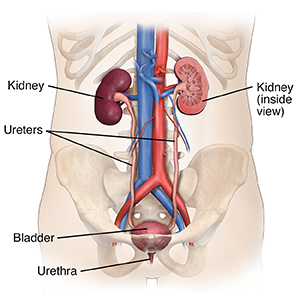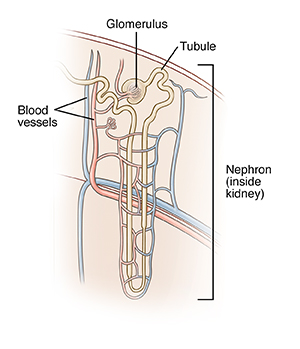Kidney Problems
The kidneys may fail from reduced blood supply, damaged blood vessels or filtering units (nephrons), or a blocked urinary tract. Illnesses that affect the entire body, such as diabetes or high blood pressure, are the most common cause of kidney damage. Illnesses that harm the kidneys directly (such as glomerulonephritis and polycystic disease) may also cause filtering problems. Kidney damage can be short-term (temporary) or lifelong (permanent), depending on what caused it.
 |
| Normal urinary tract. |
 |
| Normal nephron. |
Problems with blood vessels
An illness can damage blood vessels inside the kidneys. As a result, the nephrons get less blood, and pressure inside the kidneys can't be controlled.
Problems with nephrons
Reduced blood supply or the wrong pressure can harm the nephrons. This makes them less able to remove wastes from the blood. As a result, the kidneys can’t maintain the correct balance of fluid and chemicals in the body. Waste products may be returned to the blood. Or vital chemicals and proteins may be lost in the urine.
Problems in the urinary tract
A problem with the structure of the urinary tract may be present from birth or it may develop over time. The urinary tract can become blocked any place between the kidney and the tube that lets urine pass out of the body (the urethra). There are many reasons for such a blockage. These include kidney stones, scar tissue from past infections, or an enlarged prostate gland. Abnormal function of the urinary tract can also lead to damage to the kidney. For instance, there may be urine backflow from the ureter to the kidney. Or a damaged bladder muscle may lead to holding urine. If waste can’t leave the body, your health is at risk.